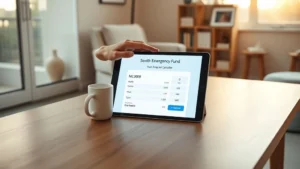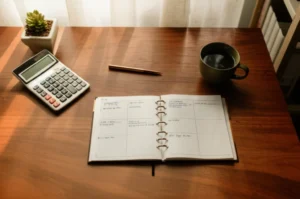Alright, let’s get straight to it: ever wonder what exactly a budget can do for you? Like, is it just about listing numbers, or is there some magic behind the scenes? The truth is, a budget isn’t some boring, restrictive list of rules—it’s your financial GPS. It helps you see clearly where your money’s going, so you can take control instead of feeling like your wallet has a mind of its own.
And yeah, it might feel messy or overwhelming at first—trust me, been there—but once you get the hang of it, budgeting can actually be freeing. It cuts down stress, helps you dodge debt, and makes those far-off dreams (vacations, new home, debt freedom) feel within reach. But, like anything, it’s about balance: knowing what to prioritize and when to flex a little.
Why The Question Matters
What People Really Want To Know
When folks ask, “what can a budget help you do?” they’re not just fishing for textbook answers. Usually, they want practical help with real money chaos—whether it’s trying to stop spending beyond their means today or plotting for a big goal down the road. The question is a way to make sense of money management—and, honestly, to find hope that it’s doable.
Clearing Up Some Myths
Budgets get a bad rap. People often think it means no fun, no wiggle room, just harsh restrictions. But that’s high drama, not budget reality. A budget is more like setting your money’s priorities consciously: you say yes to the essentials and meaningful treats, no to impulse buys that don’t fit your values. Remember, budgets aren’t a one-and-done deal; they evolve as your life and goals do.
How Exactly Can A Budget Help?
Gain Crystal-Clear Control Over Spending
Think of a budget as a flashlight in a dark room—it helps you spot the sneaky leaks where your money disappears. Tracking both income and expenses shines a light on habits you never noticed. That daily fancy coffee? Those tiny online purchases? Suddenly, they jump out at you.
There are tools to help here—everything from apps to the trusty notebook. Just knowing where you stand means fewer surprises and more peace of mind.
Setting Spending Priorities Right
So, what should you prioritize when creating a budget? Spoiler: essentials come first—think rent, groceries, utilities—then savings and debt payments, and after that, treats and extras. If you want to dive deeper, there’s a great guide on what should be prioritized when creating a budget? that breaks this down simply.
Figuring out priorities quickly shows you where to cut back and where to invest, which makes your budget feel less like a punishment and more like a smart plan.
Reaching Your Financial Goals Faster
Budgets bridge the gap between daydreaming about goals and actually hitting them. Want to save for an emergency fund? Planning a trip? Paying off credit cards? Your budget turns these hopes into monthly targets you can track.
Interestingly, lots of learners ask “how can a budget help you reach your financial goals” in places like EverFi or Quizlet. The simple answer? A budget turns big, vague goals into smaller, actionable steps, making progress manageable and encouraging.
If you’d like, here’s a helpful resource on how can a budget help you reach your financial goals everfi — it’s got practical pointers you might find useful.
Cut Stress And Make Smarter Choices
It’s not just about dollars—it’s about peace of mind. When you know exactly what’s coming in and going out, financial anxiety drops. Less guessing means less last-minute scrambles or awkward calls for help.
Plus, the more you practice, the better your instincts get at spotting “do I really need this now?” moments versus “let’s wait and save.” It’s like training your brain to be your money’s best friend.
How To Budget When Money Is Tight
Budgeting on a low income can feel like you’re walking a financial tightrope without a net. But even then, a budget is your lifeline. It forces you to focus on those must-pays and cut back smartly on what’s not essential.
Innovative budgeting strategies—like building small cushions, prioritizing debts carefully, and tapping into community resources—can make a big difference. Curious about how to handle budgeting with limited cash? This topic deserves a spotlight and practical steps you can start right now.
Which Budget Style Fits You?
Zero-Based Budgeting
This method assigns every dollar a job—no wandering cash allowed. Great if you want tight control and hate the “mystery spending” feeling. Some find it freeing to have every dollar accounted for, but beware—it takes attention.
50/30/20 Budget
A simpler, friendlier approach that splits income into needs, wants, and savings/debt. It’s easy to grasp and flexible enough for beginners, but might need tweaking if your expenses or goals don’t fit this neat box.
Cash Envelope System
The tactile, old-school favorite. Use actual cash divided into envelopes for categories (like groceries, entertainment). It curbs overspending by physically limiting what’s available but might feel clunky in a digital age.
Flexible Budgeting For Irregular Income
If cash flow’s a rollercoaster ride, this approach is your buddy. It focuses on covering essentials first, using averages to plan, and adjusting savings or treats when money’s tight or plentiful.
How To Build A Budget That Sticks
Step 1: Know Your Income And Fixed Expenses
Gather the basics: paychecks, benefits, side hustle money, rent, utilities, loan minimums. Having a clear picture here is key.
Step 2: Track Those Tricky Variables
For about a month, jot down or use apps to record things like groceries, transport, eating out, and random treats. Those little expenses add up fast!
Step 3: Decide What Comes First
Remember the priority list? Essentials first, then savings and debt, then fun money. Use a checklist or guide like what should be prioritized when creating a budget? to help decide.
Step 4: Plan For Surprises
Emergencies happen. Life throws curveballs. Build small buffers into your plan—even $5 here and there adds up. It saves headaches big time.
Step 5: Review And Tweak Regularly
Your budget isn’t chiseled in stone. Life changes, bills change, goals shift. Check in monthly to see what’s working, what’s not, and adjust with kindness to yourself.
Facing Budget Hiccups? Here’s How To Bounce Back
Burnout And Feeling Boxed In
Budgeting can feel like a joy killer if you’re super strict. The fix? Give yourself “fun money”—a guilt-free pot for little treats. It keeps motivation alive and prevents the dreaded “I quit” feeling.
Irregular Income Blues
If your earnings bounce around, base your budget on a sensible average and lock in essentials first. Savings and wants become the flexible parts. This approach helps avoid panic on lean months.
Underestimating Costs
Unexpected expenses sneak up on everyone. Build a buffer into variable categories or use a 90-day rolling average to smooth out surprises.
Getting Too Fancy
Complicated spreadsheets and endless categories might sound great but can lead to overwhelm. Start simple, then add layers when you feel ready.
Tools And Resources That Light The Way
Helpful Apps and Software
From beginner-friendly apps to advanced budget planners, there’s plenty out there. Pick one that feels intuitive to your style—not the shiniest on the shelf.
Templates That Simplify The Process
Sometimes all you need is a straightforward worksheet. Look for free zero-based budgeting templates or ones designed for low-income households to get started quickly.
Real Talk: What Can A Budget Help You Do?
At its heart, what can a budget help you do? It helps you see money clearly, prioritize wisely, and plan confidently for what matters. It’s your financial compass—sometimes steady, sometimes needing recalibration—but always pointing you toward freedom and choice.
And if you want to explore more about how can a budget help you reach your financial goals everfi, that’s a neat spot full of practical tips and motivation.
So, what do you think? Ready to start your own budget experiment? Remember, it’s not about perfection but progress. Feel free to come back to your plan, tweak it, and make it your own. And hey, if you ever get stuck, you know where to find a little help!













